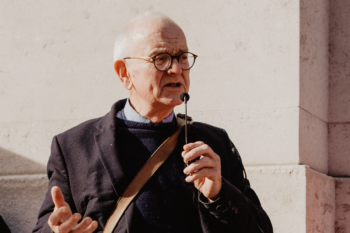
Dr Henry Marsh addressed the All-Party Parliamentary Humanist Group (APPHG) yesterday to outline why he supports legal assisted dying. Dr Marsh is a renowned neurosurgeon and bestselling author of Do No Harm. Last year he was diagnosed with advanced prostate cancer, with a prognosis of between one and five years. The Group also heard from assisted dying campaigner Lauren Nicklinson, whose father, Tony, lost his high-profile case for the right to die ten years ago this summer; Louise Doublet, Deputy of the States of Jersey Assembly and Channel Islands Humanists committee member; and Humanists UK Chief Executive Andrew Copson.
Dr Marsh talked about his experience as someone who anticipates wanting an assisted death, and why he’s now campaigning for a change in the law. He commented:
‘As a doctor, I won’t go into detail about how bad death can be. But it can be. The irony in my case is that I have advanced prostate cancer. Prostate cancer typically spreads through the spine. I must have operated on hundreds of men with prostate cancer surgery. Surgery only postpones paralysis. Most of these patients, if they weren’t lucky enough to be finished off by soft tissue disease, would have died doubly incontinent and paralysed and that is very probably the fate that awaits me. And I’ve always felt I might choose differently.’
This August will mark 10 years since Tony Nicklinson’s death. Lauren Nicklinson implored Parliamentarians to remember Tony’s suffering:
‘When they are old enough I will explain to my two young boys who their grandfather was and what his suffering meant. I want to be able to say that it had meaning. I want to be able to say that my Government, our Parliament, has taken what they can from his pain, and reformed the law.’
Louise Doublet talked about the current reform process in Jersey. It is currently passing the first assisted dying law in the UK and crown dependencies, after it ran a citizens’ jury process that found strong public support for reform. She said:
‘The debate that we had was difficult in the sense that we felt the weight of the decision. There was a lot of self-reflection during the debate from members. Many described it as one of the most important decisions we would ever have to make. And I am so proud of the way the debate went… I am optimistic that we will end with a service that’s in the best interest of our Islanders and will alleviate a lot of suffering.’
Jersey Deputies voted by 39 to 10 in favour of an assisted dying law last year.
Andrew Copson closed the speeches by outlining Humanists UK’s views on the state of play and how parliamentarians can best focus their efforts:
‘An inquiry would be able to investigate the international models of assisted dying legislation to determine which would be most suitable for the UK. An inquiry would be able to examine the views of the public, medical professionals, and people with disabilities. It would be able to answer how palliative care and assisted dying are two faces of the same coin, not opposing forces. With no legislation, debates, or votes currently set in Parliament, this would be the ideal time for it.’
After the presentations, APPHG members discussed what might be the most appropriate bodies to undertake such an inquiry, and other future avenues for reform.
The meeting on assisted dying was chaired by APPHG Co-Chair Baroness Joan Bakewell. It followed on from the AGM of the Group.
Notes:
For further comment or information, media should contact Humanists UK Director of Public Affairs and Policy Richy Thompson at press@humanists.uk or phone 020 7324 3072 or 020 3675 0959.
Read more about our work on assisted dying.
Read more about Humanists in Parliament.
Humanists UK is the national charity working on behalf of non-religious people. Powered by 100,000 members and supporters, we advance free thinking and promote humanism to create a tolerant society where rational thinking and kindness prevail. We provide ceremonies, pastoral care, education, and support services benefitting over a million people every year and our campaigns advance humanist thinking on ethical issues, human rights, and equal treatment for all.
